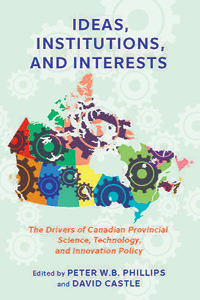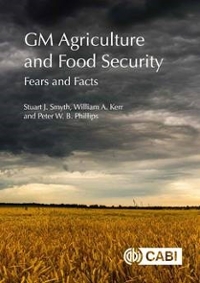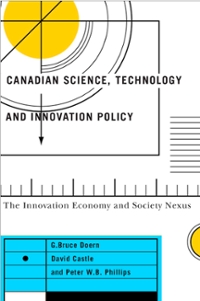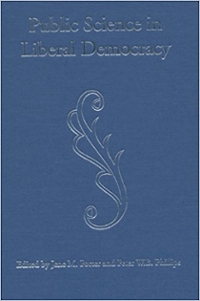Ideas, Institutions, and Interests: The Drivers of Canadian Provincial Science, Technology, and Innovation Policy

Canada’s thirteen provinces and territories are significant actors in Canadian society, directly shaping cultural, political, and economic domains. Regions also play a key role in creating diversity within innovative activity. The role of provinces and territories in setting science, technology, and innovation policy is, however, notably underexplored. Ideas, Institutions, and Interests examines each province and territory to offer real-world insights into the complexity and opportunities of regionally differentiated innovation policy in a pan-continental system. Contributing scholars detail the distinctive ways in which provinces and territories articulate ideas and interests through their institutions, programs, and policies. Many of the contributing authors have engaged first-hand with either micro- or macro-level policy innovation and are innovation leaders in their own right, providing invaluable perspectives on the topic. Exploring the vital role of provinces in the last thirty years of science, technology, and innovation policy development and implementation, Ideas, Institutions, and Interests is an insightful book that places innovation policy in the context of multilevel governance.
GM Agriculture and Food Security: Fears and Facts

By: Stuart Smyth, University of Saskatchewan, Canada, William Kerr, University of Saskatchewan, Canada, Peter Phillips, Department of Agricultural Economics, University of Saskatchewan, Canada
Efforts to improve food security in the developing world have been hampered due to myths surrounding GM agriculture. This book explores the theory, evidence and rhetoric of the impact of food production on the environment, and the impact of the environment on food production. The chapters address: food security and technology; expertise and opportunism; the promise of technology; the politicization of risk; industrial agriculture; the meaning of 'natural'; the potential of the local food movement; food labelling; genetic diversity in the agro-industrial era; sustainability and chemical application; plant vitality; and future prospects for food security. Each chapter includes a personal introduction from the authors about the issues at hand, followed by a detailed analysis with further references. The book considers the origins of concerns and then examines the evidence around the issues, and the impacts in terms of policy, regulation and agricultural practice. It also:
- Refutes common consumer and environmental organization myths about biotechnology.
- Highlights the importance of food security in both the developing and developed world.
- Provides a pro-science approach to increasing food security.
This book will be of interest to students and researchers in biotechnology, food security and public understanding of science, and also to policy makers, regulators and industry managers.
GE3LS in Brief
Edited by Peter W.B. Phillips and David CastleIn collaboration with: Bill Boland, Nancy Carlson, David Castle, Lisa Clark, Keith Culver, Jeremy de Beer, Nick Dragojlovic, Edna Einsiedel, Kari Doerksen, Richard Gold, Mauricio Guaranga, Lisa Jategaonkar, Mavis Jones, Meritt Kocdag, Jaime Leonard, Lyne Létourneau, Jean-Michel Marcoux, Sarah McPhee-Knowles, Simona Lubieniechi, Alexandra Mogyoros, John Moodie, Rebecca Moore, Ata-Ul Munim, Peter W.B. Phillips, Jeremy Rayner, Cami Ryan, Puja Sharma, Stuart Smyth.
Value Addition through Genomics and GE³LS (VALGEN), was launched 1 October 2009, as an international research network. VALGEN was designed to support groundbreaking research on social aspects of bioscience and biotechnology innovation. Through the competition in Applied Genomics Research in Bioproducts or Crops (ABC) Genome Canada invested in 12 large-scale projects focused on applied genomics research in bioproducts and crops. The 12 projects had a total approved budget of C$112M. VALGEN, a four-year, $5.4M project was unique among these projects with its primary focus on ethical, environmental, economic, legal and social issues in genomics (GE3LS). The project and network was managed by Genome Prairie and administered through the University of Saskatchewan.
As you will appreciate, this edited book provides resource material rather than being a how-to manual. It offers brief, concise and structured overtures to a wide range of old and new models, methods and metrics related to the governance of transformative technologies.
Canadian Science, Technology and Innovation Policy: The Innovation Economy and Society Nexus

By: G. Bruce Doern, David Castle and Peter W.B. Phillips
McGill-Queen's University Press
Canadian Science, Technology, and Innovation Policy presents new critical analysis about related developments in the field such as significantly changed concepts of peer review, merit review, the emergence of big data in the digital age, and the rise of an economy and society dominated by the internet and information.
The authors scrutinize the different ways in which federal and provincial policies have impacted both levels of government, including how such policies impact on Canada’s natural resources. They also study key government departments and agencies involved with science, technology, and innovation to show how these organizations function increasingly in networks and partnerships, as Canada seeks to keep up and lead in a highly competitive global system. The book also looks at numerous realms of technology across Canada in universities, business, and government and various efforts to analyze biotechnology, genomics, and the Internet, as well as earlier technologies such as nuclear reactors, and satellite technology. The authors assess whether a science-and-technology-centred innovation economy and society has been established in Canada - one that achieves a balance between commercial and social objectives, including the delivery of public goods and supporting values related to redistribution, fairness, and community and citizen empowerment.
Probing the nature of science advice across prime ministerial eras, including recent concerns over the Harper government’s claimed muzzling of scientists in an age of attack politics, Canadian Science, Technology, and Innovation Policy provides essential information for academics and practitioners in business and government in this crucial and complex field.
Public Science in Liberal Democracy

By: Jene Porter and Peter W.B. Phillips
University of Toronto Press, Scholarly Publishing Division © 2007
Regardless of whether science is practised in industry, the academy, or government, its conduct inescapably shapes and is shaped by democratic institutions. Moreover, the involvement of science with public policy formation and democracy has dramatically increased over the centuries and, by all accounts, will continue to do so. In order to understand the functioning of science and democracy, it is necessary to acknowledge the complex relationship between them. Public Science in Liberal Democracy aims to do this from an interdisciplinary perspective, presenting an array of substantively different positions on the issues that it explores.
The volume focuses on three major questions: Can science retain independence and objectivity in the face of demands to meet commercial and public policy objectives? In what ways is scientific discourse privileged in the formation of public policy? How can scientific knowledge and methodology be made compatible with the interdisciplinarity and integration required of public policy formation and discourse? Representing a wide range of viewpoints, the contributors to Public Science in Liberal Democracy come from Canada, Europe, the United States, and Australia, and include practising scientists as well as scholars working in the humanities and social sciences. This timely and thought-provoking collection makes an important contribution to the literature and will appeal to anyone interested in scientific research and its political and philosophical ramifications in democratic society.
Governing Transformative Technological Innovation Who’s in Charge?
By: Peter W.B. Phillips (2007)
New technologies often appear to be beyond the control of any existing governing systems. This is especially true for transformative technologies such as information technologies, biotechnologies and nanotechnologies. Peter Phillips examines in this book the deep governing structures of transformative technology and innovation in an effort to identify which actors can be expected to act when, under what conditions and to what effect. He analyzes the life cycles of an array of examples where converging technologies have created transformations and supervisory challenges.
Innovation in Agri-food Research Systems: Theory and Case Studies
By: Peter W.B. Phillips, G Webb, J Karwandy & C Ryan (2012)
Innovation has moved through a range of revolutionary epochs, but there is no clear picture of how, or even if, innovation can be managed. This book explores the models, methods and metrics of innovation analysis in the context of a single centre: the Global Oilseeds Complex centred in Saskatoon, Canada. It is a single, coherent volume that outlines the theory and practices related to innovation, offering a critical assessment of the strengths and weaknesses of the different approaches, backed up with empirical evidence.
The Coexistence of Genetically Modified, Organic and Conventional Foods
By: Kalaitzandonakes, N., Phillips, P.W.B., Wesseler, J., Smyth, S.J. (Eds.) (2016)
Since their commercial introduction in 1996, genetically modified (GM) crops have been adopted by farmers around the world at impressive rates. In 2011, 180 million hectares of GM crops were cultivated by more than 15 million farmers in 29 countries. In the next decade, global adoption is expected to grow even faster as the research pipeline for new biotech traits and crops has increased almost fourfold in the last few years. The adoption of GM crops has led to increased productivity, while reducing pesticide use and the emissions of agricultural greenhouse gases, leading to broadly distributed economic benefits across the global food supply chain. Despite the rapid uptake of GM crops, the various social and economic benefits as well as the expanding rate innovation, the use of GM crops remains controversial in parts of the world. Despite the emergence of coexistence between GM, organic and conventional crops as a key policy and practical issue of global scale, there is no coherent literature that addresses it directly. Governments and market stakeholders in many countries are grappling with policy alternatives that settle conflicting property rights, minimize negative market externalities and associated liabilities, maximize the economic benefits of innovation and allow producer and consumer choice. This book intends to fill these needs with contributions from the top theoreticians, legal and economic analysts, policy makers and industry practitioners in the field. As the economics and policy of coexistence start to emerge as an separate subfield in agricultural, environmental and natural resource economics with an increasing number of scholars working on the topic, the book will also provide a comprehensive base in the literature for those entering the area, making it of interest to students, scholars and policy-makers alike.
Handbook on Agriculture, Biotechnology and Development
Edited by: Stuart J. Smyth, Assistant Professor, Department of Bioresource Policy, Business and Economics, University of Saskatchewan, Peter W.B. Phillips, Distinguished Professor of Public Policy, University of Saskatchewan and David Castle, Professor of Public Administration and Vice President Research, University of Victoria, Canada
Edward Elgar Publishing
This book is a compendium of knowledge, experience and insight on agriculture, biotechnology and development. Beginning with an account of GM crop adoptions and attitudes towards them, the book assesses numerous crucial processes, concluding with detailed insights into GM products. Drawing on expert perspectives of leading authors from 57 different institutions in 16 countries, it provides a unique, global overview of agbiotech following 20 years of adoption. Many consider GM crops the most rapid agricultural innovation adopted in the history of agriculture. This book provides insights as to why the adoption has occurred globally at such a rapid rate.
Accessing and Sharing the Benefits of the Genomics Revolution
Editors: Phillips, Peter W.B., Onwuekwe, Chika B. (Eds.)
There is a veritable gold rush mentality in the life science world as scientists, entrepreneurs and multinationals are staking claims to the ‘code of life’ embodied in the world’s current stock of plants, animals, microbes and human populations. In response, the communities that see themselves as the custodians of both that traditional knowledge and specific genetic resources have demanded greater recognition of their role in creating and conserving this resource, access to any resulting improvements and a share of the benefits arising from their patrimony. This has precipitated a widespread effort—in local communities, in the marketplace, in many developing and developed countries and at the talks in the Doha Round of the WTO—to reconcile the interests and concerns of the two opposing groups.
This edited volume explores the legal, economic and political context for the debate about intellectual property rights for traditional knowledge and genetic resources and critically analyses the theory and practice of access and benefits sharing efforts around the world. The book also investigates the current flashpoints—the David and Goliath battle between Monsanto and Percy Schmeiser over farmers’ rights; the dispute over coexistence of GM and organic production; and the ownership and control of human genetic materials stored in human gene banks around the world.

